For all the political and economic uncertainties about health reform, at least one thing seems clear: The bill that President Obama signed on Tuesday is the federal government’s biggest attack on economic inequality since inequality began rising more than three decades ago. Over most of that period, government policy and market forces have been moving in the same direction, both increasing inequality. The pretax incomes of the wealthy have soared since the late 1970s, while their tax rates have fallen more than rates for the middle class and poor.
When I started reading this article, I had the strangest reaction. It made me anxious. I had to stop and think about it for a moment – to figure out why. The answer is something of a long story. I’ll try to be brief. In the early 1980’s when Reagan was elected, I was just 40 years old and finally winding up a lifetime of being a poor student and making a decent salary. We’d bought an old "fixer-upper" and set about "fixing her up." I was working a lot and so was my wife. I read about "Reaganomics" and "trickle down economics,"and I thought it was the craziest thing I’d ever heard in my entire life. But I was busy finally being an adult, and I had other fish to fry. Throughout my career years, it kept nagging at me – so I was overjoyed when Clinton was elected. And by my reckoning, he was setting things right. I guess I thought the age of Reagan was finally over. Obviously, I was wrong about that because it came back with a vengeance in the form of George Bush.
To be honest, I had no idea then about Cheney and the neoconservatives at that point. It was the wealth inequity and the erosion of Civil Rights that worried me. But then came 9/11, and Iraq, and all my energy went into outrage about the deceit and the war. I worried about his deficit spending and the National Debt as an aside, but the Imperialism was on the front burner. And for the first time ever, I had time to think about these things in a more comprehensive way. Instead of working the crossword puzzle then working until after the evening news, I read the whole paper and watched several versions of the news. When the financial crisis hit, thirty years of background age of Reagan hit me in the soul. I dealt with it by poring over pages of government numbers [creating graphs that looked like gaudy wedding cakes]. And the age of Reagan began to feel like the rape of Reagan.
So why did that first paragraph make me anxious?
PTSD is the answer – post traumatic stress disorder. I’m afraid of getting my hopes up. It took the Republicans half a century to start undoing what FDR did after the Depression, but it only took them eight years to nullify Clinton. They know how to do it now. So when I read that first paragraph that the healthcare bill was an assault on the deplorable wealth inequity in America, my anxiety soared. It’s the thing I’d most hoped Obama would do something about, but it makes me anxious. The
robber barons [thanks to
Howard for the term] are going to go crazy, and they scare me because they’ve got the money, the media, and no scruples. Look what they did in 1994 and 2000-2005! All of that said,
Hip, Hip, Hooray for President Obama!
Nearly every major aspect of the health bill pushes in the other direction. This fact helps explain why Mr. Obama was willing to spend so much political capital on the issue, even though it did not appear to be his top priority as a presidential candidate. Beyond the health reform’s effect on the medical system, it is the centerpiece of his deliberate effort to end what historians have called the age of Reagan. Speaking to an ebullient audience of Democratic legislators and White House aides at the bill-signing ceremony on Tuesday, Mr. Obama claimed that health reform would “mark a new season in America.” He added, “We have now just enshrined, as soon as I sign this bill, the core principle that everybody should have some basic security when it comes to their health care”
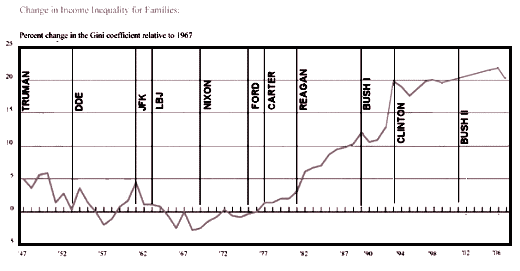 The Gini Coefficient is a way of quantifying wealth inequity
The Gini Coefficient is a way of quantifying wealth inequity
The bill is the most sweeping piece of federal legislation since Medicare was passed in 1965. It aims to smooth out one of the roughest edges in American society — the inability of many people to afford medical care after they lose a job or get sick. And it would do so in large measure by taxing the rich.
A big chunk of the money to pay for the bill comes from lifting payroll taxes on households making more than $250,000. On average, the annual tax bill for households making more than $1 million a year will rise by $46,000 in 2013, according to the Tax Policy Center, a Washington research group. Another major piece of financing would cut Medicare subsidies for private insurers, ultimately affecting their executives and shareholders. The benefits, meanwhile, flow mostly to households making less than four times the poverty level — $88,200 for a family of four people. Those without insurance in this group will become eligible to receive subsidies or to join Medicaid. [Many of the poor are already covered by Medicaid]. Insurance costs are also likely to drop for higher-income workers at small companies.
Finally, the bill will also reduce a different kind of inequality. In the broadest sense, insurance is meant to spread the costs of an individual’s misfortune — illness, death, fire, flood — across society. Since the late 1970s, though, the share of Americans with health insurance has shrunk. As a result, the gap between the economic well-being of the sick and the healthy has been growing, at virtually every level of the income distribution…
Here’s one of my gaudy wedding cake graphs. The X Axis is the year; the Y Axis is the % bracket for Income Tax; the Z Axis is the Taxable Income [in 2008 $]; and the colors represent the political party of the President:
If you can follow it, on the left side of the graph, FDR really leaned on the super-wealthy to pay for World War II [and the post-Depression New Deal. The big hit started with people that made $1M [in today’s $] at 50% and rose to 94% for the fabulously wealthy. And that kind of taxation of the rich persisted until 1965 when LBJ capped Income Tax at a maximum of 70%. Nixon came along in 1968, and was something of a big spender, much of it on the war in Viet Nam. He made up for the loss of revenue from the fabulously wealthy by edging up taxation on the just plain rich [$400,000/yr to $1,000,000/yr], shown more clearly in this focused graph:
Ronald Reagan and George H.W. Bush came on the scene in 1980 fueled by all the fury left over from FDR’s taxation of the rich and had themselves a field day. In a series of dramatic tax cuts, they leveled the playing field creating what I call the Reagan Trough.
This is what they like to call the Reagan Revolution or the Reagan Age. The problem was that the cut in revenue was not matched by a cut in spending, so the debt exploded.
Speaking of spending:
Clinton, in my opinion, got it right. He restored the Income Tax graduation only slightly, but combined with the first real spending cuts since World War II, he got us on the road to success. To my way of thinking, the tragedy of the 2000 election coup was that Clinton’s fiscal policies which would have continued under Gore were cut short by George Bush who did the Reagan thing – cut taxes and increase spending – leaving us unbuffered for the financial crisis of 2008.
The tragedy is that the recent debt is overseas, mainly to China.
What Obama is doing is the only thing he can do. He had to do the Stimulus Bill to avert a Depression. He has to increase taxes [in the Clinton way] to begin to climb us out of debt. He has to end the wars – the wars we can’t or really never could afford. But to throw in Health Care Reform was a stroke of genius. We need it. And long term, we need it for more than humanitarian reasons. Medical costs have to be reined in for our economy to thrive. That’s not optional. To combine medical reform with a moderate, needed tax increases is dead on the mark. And we have no reserve to carry us through another Reaganomics cycle. We just can’t continue with the kind of wealth inequity we’ve created. So my anxiety when I started reading this article is a terror that the Republicans are going to throw another fly in the ointment, and sabotage our chance at salvation. I’m sending me a check to the Democrats today…

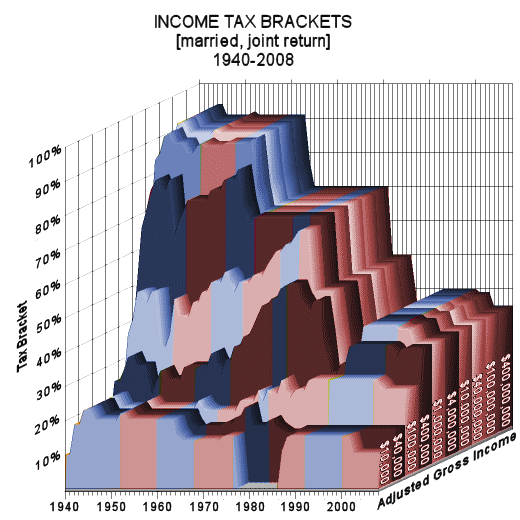
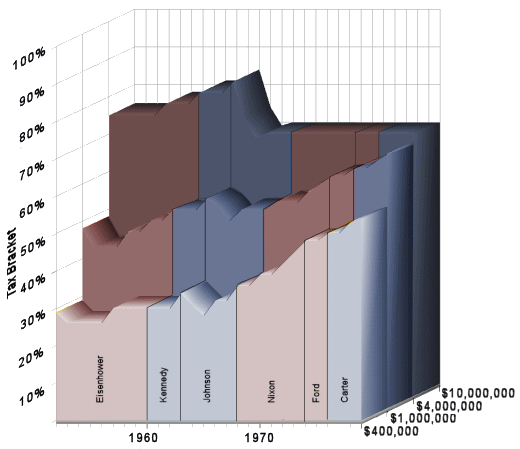
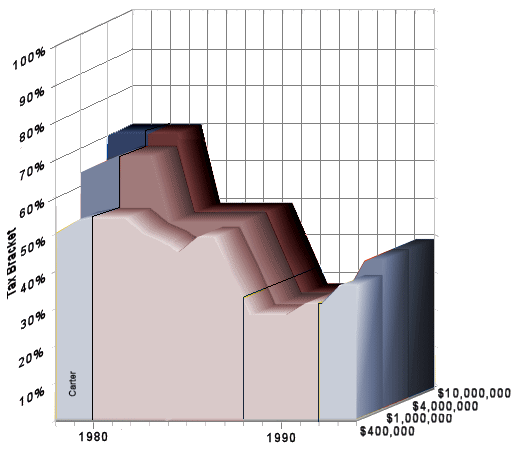
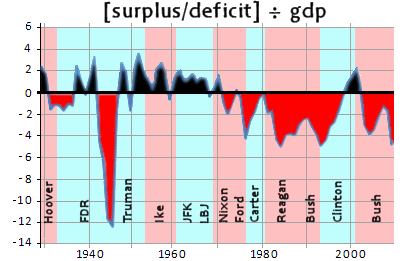
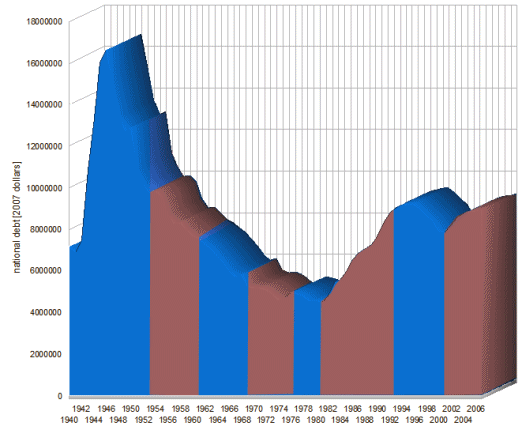
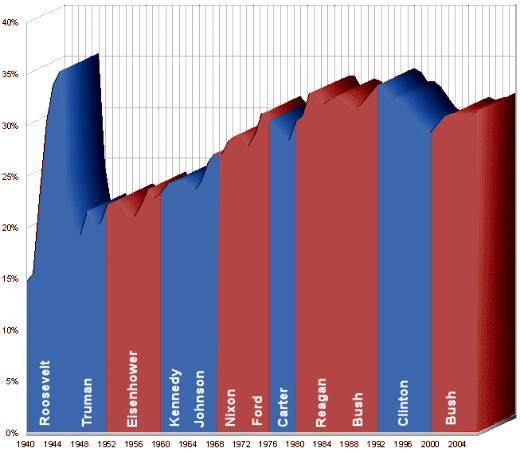
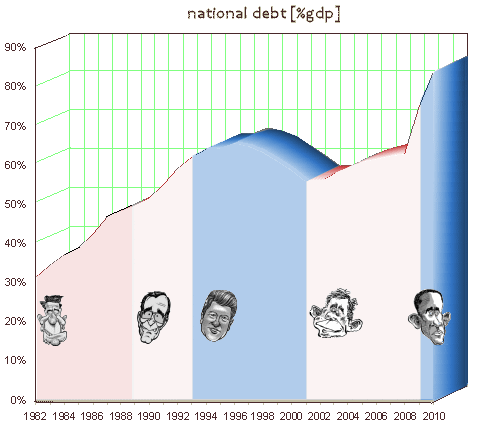
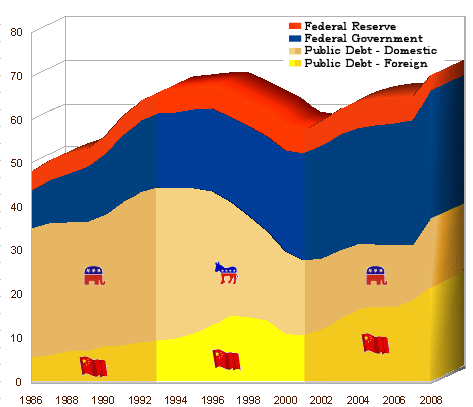
[…] Healthcare Reform season seems to be winding down, at least in Congress, and we’re entering the cycle of Financial Reform Legislation. Congressmen Chris Dodd and Barney Frank held a recent Press Conference to roll out their Billl – now out of Committee and headed to the floor of the Congress [over 1300 pages!]. Just perusing the Internet commentary, like Healthcare before it, this Bill is either way too soft or way to harsh – depending on the point of view [and Political Party] of the author. While I’d love to summarize how the Bill addresses the various issues ["too big to fail," derivatives and credit default swaps, "financial bubbles," the national debt, etc], that will have to await people with more skill than I. I’m limited to looking back at what happened this time [way just right…, the parade of my old wedding cake graphs…]. […]
I think we need only to raise some money, develop the appendix for your reference data, print and furnish sufficient copies to the U.S. House, Senate, Federal Reserve, GAO etc..